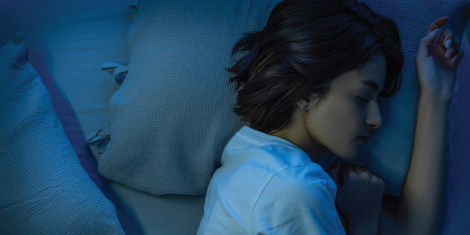No products in the cart.

Sleep myths abound due to the ambiguity that surrounds sleep and its health benefits. We’ve compiled a list of five of the most common sleep myths in order to set the record straight.
-
- Sleep is a time when your body and brain shut down for rest.
Although your body is mostly immobile during sleep, your brain remains very active. During sleep your brain regulates many functions in the body and follows a complex series of orchestrated events every night.
- Sleep is a time when your body and brain shut down for rest.
-
- You can make up for lost sleep during the week by sleeping more on the weekend.
Incurring “sleep debt” during the week by consistently sleeping less than is necessary cannot be remedied by longer sleep sessions on the weekends. The benefits of a long sleep session will only show benefits for as little as 6 hours after waking and can cause long-term health problems.
- You can make up for lost sleep during the week by sleeping more on the weekend.
-
- Naps are a waste of time.
Although daytime naps are often viewed as an indication of laziness, research shows that a quick 25 minute nap during the workday can improve productivity. Even some of our most famous scientists, politicians, athletes and artists favored daily naps, including Thomas Edison, Leonardo DaVinci, Connie Mack, Winston Churchill, Ronald Reagan and John F. Kennedy.
- Naps are a waste of time.
-
- Snoring is a normal part of sleep and isn’t harmful.
Snoring may be harmless for some people but it can also be a symptom of obstructive sleep apnea, especially if accompanied with daytime sleepiness. Loud, chronic snoring is more indicative of this condition. Obstructive sleep apnea is a life-threatening condition that can reduce blood oxygen levels, increase the risk of high blood pressure and heart attacks.
- Snoring is a normal part of sleep and isn’t harmful.
- Daytime fatigue always means a person isn’t getting enough sleep.
Excessive fatigue after getting sufficient sleep can be a sign of an underlying medical condition or sleep disorder. Sleep disorders such as obstructive sleep apnea, insomnia, circadian rhythm disorder and narcolepsy can all cause daytime sleepiness and should be evaluated by a sleep specialist. Other causes of daytime fatigue include clinical depression, tumors, hypothyroidism, drug abuse and a vitamin deficiency.
You might also be interested in:

-
/
Rest for Success: When to Bid Adieu to Your Old Mattress
Rest for Success: When to Bid Adieu to Your Old Mattress We spend about a third of our lives in bed, and the quality of our sleep directly impacts our overall well-being. One often overlooked factor in achieving a good night’s sleep is the condition of our mattress. As the years go by, our faithful […]
Read more
Unveiling the Truth: Busting Common Mattress Myths
Unveiling the Truth: Busting Common Mattress Myths A good night’s sleep is crucial for overall well-being, and the right mattress plays a pivotal role in achieving that. However, amidst the quest for the perfect mattress, numerous misconceptions have caused mattress shoppers confusion when searching for the right mattress. Our latest blog unravels the truth behind […]
Read more
-
/
How Medical Bed Mattresses Aid in Post-Surgery Recovery
How Medical Bed Mattresses Aid in Post-Surgery Recovery Surgery can be a daunting experience, regardless of its nature or severity. The period following a surgical procedure, known as post-surgery recovery, is crucial for achieving the best possible outcome. While factors like rest, nutrition and pain management are widely acknowledged as vital, the role that medical […]
Read more
-
/
Meeting Medical Mattress Quality Standards
Meeting Medical Mattress Quality Standards Medical mattresses are designed to meet specific quality standards to ensure patient safety, comfort and hygiene. These standards are established to address the unique needs of healthcare environments as well as the patients utilizing these mattresses. Some key quality standards for medical mattresses include: Infection Control Standards Water […]
Read more